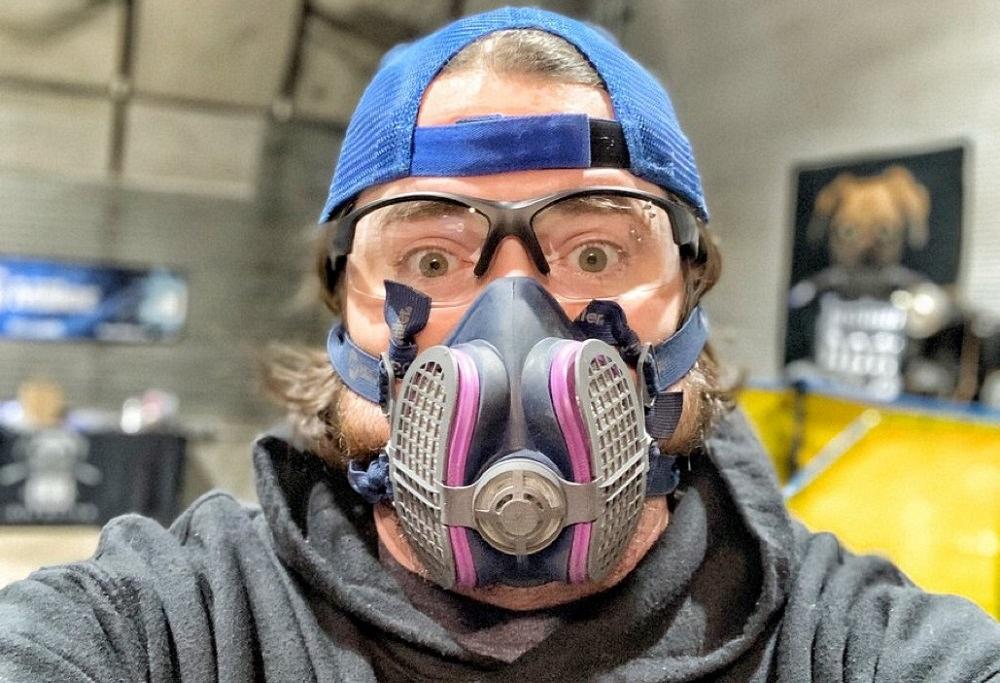Owner, Brown Dog Welding
- FMA
- The Fabricator
- FABTECH
- Canadian Metalworking
Categories
- Additive Manufacturing
- Aluminum Welding
- Arc Welding
- Assembly and Joining
- Automation and Robotics
- Bending and Forming
- Consumables
- Cutting and Weld Prep
- Electric Vehicles
- En Español
- Finishing
- Hydroforming
- Laser Cutting
- Laser Welding
- Machining
- Manufacturing Software
- Materials Handling
- Metals/Materials
- Oxyfuel Cutting
- Plasma Cutting
- Power Tools
- Punching and Other Holemaking
- Roll Forming
- Safety
- Sawing
- Shearing
- Shop Management
- Testing and Measuring
- Tube and Pipe Fabrication
- Tube and Pipe Production
- Waterjet Cutting
Industry Directory
Webcasts
Podcasts
FAB 40
Advertise
Subscribe
Account Login
Search
Redefining what is considered essential in manufacturing during a crisis
- By Josh Welton
- April 11, 2020

Detroit welder Josh Welton gives his take on what should be considered essential in the manufacturing industry in the middle of the COVID-19 pandemic. Photos by Josh Welton
Before the end of March, there had never been more than 695,000 Americans filing for unemployment at the same time. Not during the Great Depression, not during the Great Recession, and not during the Energy Crisis. On March 26 we shattered that mark with 3.3 million out of work; there were 2.9 million in a single week, jumping the numbers by over 1,000%.
And with the latest unemployment figures, that number since has jumped even higher to a staggering 16.8 million. Unless your job is deemed “essential” by the government, you’re gonna either be working from home or collecting unemployment. Maybe.
Obviously we’re in the midst of a situation unique to our time, and a global one at that. The epic spread of a virus we don’t yet fully understand has forever changed every single one of our lives. There is no vaccine to take, no treatment to undergo, no pill to pop; there is no known, proven cure. Scientists and doctors are working literally around the clock to figure it out, but this is something that typically takes years. Even with the pedal to the floor we’re talking about months, not weeks, and certainly not days. It’s highly contagious, and carriers of the disease might not show symptoms for weeks (if at all) while others get terribly ill. That fact alone is scary as hell once it sinks in. Most of the infected will recover, but far too many will not.
I’m not going to go on about how poorly prepared we were for all of this, or the lack of medical tools, or the lack of personal protective equipment, or the lack of hospital space we are currently confronted with. But I’d like to present a scenario that’s been playing out far too often before taking on the question of necessity.
Imagine your significant other becomes ill. There’s a redness around their eyes, or they have trouble breathing, or their fever is high, or anything else from the litany of things that could indicate being infected by the coronavirus. If the symptoms are mild, you’ll both self-quarantine. For weeks. If the symptoms are deemed severe, then they’ll (hopefully, considering the lack of tests) get tested, probably outside of the hospital. If that test is positive they will be admitted to the hospital. They will be put in a quarantined section, perhaps even in a tent city behind the hospital. Considering the aforementioned dearth of tools at the nurses’ and doctors’ disposal, you cross your fingers, hoping they get the treatments they need. Considering how little we know about this virus, you hope it works.
But now you, for sure, have to shelter in place. You’ve definitely been exposed, so the order is to self-isolate for two weeks. Youorder groceries and supplies online and pick them up at the curb, bring them back to your house, disinfect them, use them. You find a couple of local eateries that are still open for pickup or delivery and put them on rotation for dinner. Then it’s Netflix and chill. Or try to. You can’t stop thinking about your partner.
And you definitely can’t visit them. Once you watch them being taken into the hospital, that’s it. They are quarantined, meaning no visitors. You’ll miss them for two weeks, minimum. God forbid they’re one of the increasing numbers of fatalities, because that could be the last time you see them. Ever.
How were they exposed? Was it from you? Despite the state being on a government-mandated lockdown, your job was considered “essential,” at least by your boss. “Well, critical manufacturing and transportation are on the approved list ...” he said. “... and this factory is critical to this town’s economy. And these lowboy trailers are part of transportation.”
So you showed up to work, building trailers. You tried to be careful, you tried to practice “social distancing,” but there’s only so much you can do in a public setting, and there’s always that one guy who thinks the entire thing is a conspiracy. Probably his name is Frank. “It’s just like the flu, or a cold. I’m not missing work for a freaking cold,” Frank said. Come to find out, Frank was carrying the coronavirus and didn’t know it.
Or maybe your mate caught it at their job, which was supervising a shift at the local candy factory. Why the heck was the candy factory still open? Because, technically, it falls under the “food and agriculture” heading of essential jobs. The owner, some rich lady who never steps foot in the plant and lives upstate, said no way in hell she was letting this “lockdown” destroy her bottom line. Of course, the memo to the workers didn’t say that. “In this dire time, the people need their chocolate,” it read in part.
Now your partner is in the hospital fighting for their life because a couple of businesses decided to play fast and loose with the rules. It’s partly their fault, but both the president and your state’s governor were intentionally vague. The economy is in bad shape already. Maybe we can “flatten the curve” with half- measures. Yeah, more people will die, but at least Wall Street is starting to stabilize.
A bit dramatic? Maybe. But those examples of businesses remaining open, and their reasoning, are based on real stories. Business owners everywhere are doing mental gymnastics to justify carrying on work despite the lockdown.
I get it, especially if you’re the owner/operator of a small business. This pandemic is bankrupting companies and individuals. But this isn’t localized to you, your town, your state, or even your country. This thing that’s happening is doing so on a global scale. Everyone everywhere is going to be hurt by this no matter what, but we can minimize the death toll and economic impact by simply staying home. Unless, of course, you’ve changed course to make ventilators or PPE. That truly is essential.
I work in the defense industry, which is deemed essential. But would developing and testing prototype military vehicles be dealt a death blow if everyone went home for two weeks? Would that suddenly create a chink in the armor of the USA that exposes us to war? It’s important work, no doubt. But essential during a global pandemic? Nah.
I know that this column reaches more than the blue-collar individuals who are the backbone of civilization. If you’re the owner or CEO of a large manufacturing facility, a chain of supply houses, etc., you need to take unprecedented measures. Pare down to truly essential employees and give the rest paid leave. Don’t wait on federal or state orders, because our leaders are mostly just fighting each other. JFK once said, "Ask not what your country can do for you, ask what you can do for your country," and that country is not just some abstract notion of patriotism, it's us. It’s you and me. It’s the 327.2 million people we share this land with.
The effects of the coronavirus will continue to impact the spin of the world for decades to come. And right now you’re either part of the problem or part of the solution. What will your legacy be?
subscribe now

The Fabricator is North America's leading magazine for the metal forming and fabricating industry. The magazine delivers the news, technical articles, and case histories that enable fabricators to do their jobs more efficiently. The Fabricator has served the industry since 1970.
start your free subscriptionAbout the Author

- Stay connected from anywhere

Easily access valuable industry resources now with full access to the digital edition of The Fabricator.

Easily access valuable industry resources now with full access to the digital edition of The Welder.

Easily access valuable industry resources now with full access to the digital edition of The Tube and Pipe Journal.
- Podcasting
- Podcast:
- The Fabricator Podcast
- Published:
- 04/16/2024
- Running Time:
- 63:29
In this episode of The Fabricator Podcast, Caleb Chamberlain, co-founder and CEO of OSH Cut, discusses his company’s...
- Trending Articles
Tips for creating sheet metal tubes with perforations

JM Steel triples capacity for solar energy projects at Pennsylvania facility

Are two heads better than one in fiber laser cutting?

Supporting the metal fabricating industry through FMA

Omco Solar opens second Alabama manufacturing facility

- Industry Events
16th Annual Safety Conference
- April 30 - May 1, 2024
- Elgin,
Pipe and Tube Conference
- May 21 - 22, 2024
- Omaha, NE
World-Class Roll Forming Workshop
- June 5 - 6, 2024
- Louisville, KY
Advanced Laser Application Workshop
- June 25 - 27, 2024
- Novi, MI



























